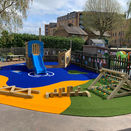Imaginative and Role Play
Imaginative and role play activities in a playground provide a rich environment for children's development, increasing creativity, social skills, and emotional intelligence. When children engage in imaginative play, they create and explore new worlds, scenarios, and characters, which enhances their creativity and encourages innovative problem-solving.
These activities also serve as a powerful tool for social development, as they often involve interaction with peers. Through role play, children practice communication, collaboration, and negotiation, learning to understand different perspectives and empathy. This social interaction is crucial for building relationships and developing cooperation skills.
Furthermore, role play significantly contributes to language development. As children take on different roles, they use language in varied contexts, expanding their vocabulary and improving their ability to express themselves clearly. This practice in articulation, questioning, and active listening strengthens their communication skills.
Emotionally, imaginative play offers a safe space for children to explore and manage their feelings. By acting out different roles, they can express emotions like fear, joy, anger, or sadness, which helps them develop emotional resilience and a better understanding of their own and others' emotions.
The cognitive benefits of role play are equally significant. As children navigate through various scenarios, they encounter challenges that require critical thinking and problem-solving. This process enhances their logical thinking and decision-making abilities, creating independence and confidence.


.png)






























